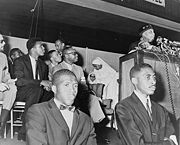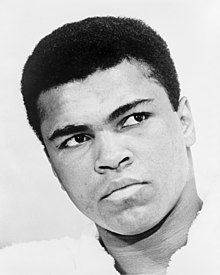Ali was born in Louisville, Kentucky. He was named after his father, Cassius Marcellus Clay Sr., who was named for the 19th century abolitionist and politician Cassius Clay. Ali changed his name after joining the Nation of Islam in 1964 and subsequently converted to Sunni Islam in 1975.
Religion

![]()
Ali at an address by Elijah Muhammad
After winning the championship from Liston in 1964, Clay revealed that he was a member of the Nation of Islam (often called the Black Muslims at the time) and the Nation gave Clay the name Cassius X, discarding his surname as a symbol of his ancestors’ enslavement, as had been done by other Nation members. On Friday, March 6, 1964, Malcolm X took Clay on a guided tour of the United Nations building (for a second time). Malcolm X announced that Clay would be granted his “X.” That same night, Elijah Muhammad recorded a statement over the phone to be played over the radio that Clay would be renamed Muhammad (one who is worthy of praise) Ali (fourth rightly guided caliph). Only a few journalists (most notably Howard Cosell) accepted it at that time. Venerable boxing announcer Don Dunphy addressed the champion by his adopted name, as did British reporters. The adoption of this name symbolized his new identity as a member of the Nation of Islam.
Clay had discovered the Nation during a Golden Gloves tournament in Chicago in 1959, even writing a high school report on the organization. His school teachers at Louisville Central High were alarmed that a youngster with that much potential expressed interest in the nationalist faith. They dissuaded him from becoming involved. Many sportswriters of the early 1960s reported that it was Ali’s brother, Rudy Clay, who converted to Islam first (estimating the date as 1962). Others wrote that Clay had been seen at Muslim rallies two years before he fought Liston. Ali’s own version is that he did buy a copy of the “Muhammad Speaks” newspaper from a Muslim in Chicago, and a 45 rpm record by Minister Louis X (later Farrakhan) called “A White Man’s Heaven is a Black Man’s Hell.”
Aligning himself with the Nation of Islam made him a lightning rod for controversy, turning the outspoken but popular former champion into one of that era’s most recognizable and controversial figures. Appearing at rallies with Nation of Islam leader Elijah Muhammad and declaring his allegiance to him at a time when mainstream America viewed them with suspicion — if not outright hostility — made Ali a target of outrage, as well as suspicion. Ali seemed at times to provoke such reactions, with viewpoints that wavered from support for civil rights to outright support of separatism. For example, Ali once stated, in relation to integration: “We who follow the teachings of Elijah Muhammad don’t want to be forced to integrate. Integration is wrong. We don’t want to live with the white man; that’s all.” And in relation to inter-racial marriage: “No intelligent black man or black woman in his or her right black mind wants white boys and white girls coming to their homes to marry their black sons and daughters.” Indeed, Ali’s religious beliefs at the time included the notion that the white man was “the devil” and that white people were not “righteous.” Ali claimed that white people hated black people.
Ali converted from the Nation of Islam sect to mainstream Sunni Islam in 1975. In a 2004 autobiography, written with daughter Hana Yasmeen Ali, Muhammad Ali attributes his conversion to the shift toward Sunni Islam made by W.D. Muhammad after he gained control of the Nation of Islam upon the death of his father, Elijah Muhammad, in 1975.
Personal life
Muhammad Ali has been married four times and has seven daughters and two sons. Ali met his first wife, cocktail waitress Sonji Roi, approximately one month before they married on August 14, 1964. Roi’s objections to certain Muslim customs in regard to dress for women contributed to the breakup of their marriage. They divorced on January 10, 1966.
On August 17, 1967, Ali married 17-year old Belinda Boyd. After the wedding, she changed her name to Khalilah Ali, following Muslim tradition, but she was still called Belinda by old friends and family. They had four children together: the eldest daughter, Maryum, was born in 1968; twin daughters, Jamillah and Rasheda, were born in 1970; Muhammad Ali’s only biological son, Muhammad Ali Jr., was born in 1972. However, Ali began an affair with a young woman named Veronica Porsche in 1974. Porsche was one of the four poster girls who had promoted the Rumble in the Jungle fight in Zaire versus George Foreman. By the summer of 1977, Ali’s second marriage was over and he had married Veronica. By the time they were married, they had a baby girl, Hana, and Veronica was pregnant with their second child. Their second daughter, Laila, was born in December of that year.
Laila Ali would follow the career of her father, eventually becoming the IBA, WIBA, and IWBF champion.
By 1986, Ali and Veronica had divorced.
On November 19, 1986, Ali married his fourth wife, Yolanda ‘Lonnie’ Ali. They had known each other since the early 1960s in Louisville, having first met when Ali was 22 and Yolanda was 6. Their mothers were close friends, although Lonnie Ali has publicly denied the popular notion that Muhammad Ali was once her babysitter. They have one adopted son, Asaad.
Ali has two other daughters, Miya and Khaliah, from extramarital relationships.
Ali trained in Taekwondo under Grand Master Jhoon Rhee, the Father of American Taekwondo.
Biography
The colorful and controversial Ali began taking boxing lessons when he was twelve years old at the urging of a Louisville policeman he talked to after his bike was stolen. As a high school student, he won the national Golden Gloves middleweight championship in 1959 and 1960 and the AAU national light heavyweight title in 1960, then went on to a gold medal in the Olympic light heavyweight division.
Under his given name, Cassius Clay, he had his first professional fight on October 29, 1960. Before his sixth professional bout, against Lamar Clark on April 19, 1961, Clay predicted a 2nd-round knockout and was right. He continued making predictions, often in rhyme, and making them come true until March 13, 1963. On that date, he won a questionable 10-round decision over Doug Jones after predicting a 4th-round knockout.
Clay was a heavy underdog when he met Sonny Liston for the heavyweight championship on February 25, 1964, at Miami Beach, FL. But he won the fight when Liston failed to come out for the 8th round, claiming a shoulder injury. In a rematch on May 25, 1965, Clay knocked Liston out with a “phantom punch” that few observers saw in the 1st round at Lewiston, ME.
Shortly after becoming champion, Clay announced that he had become a Black Muslim and changed his name to Muhammad Ali. He defended the title eight times in the next twenty months. In the meantime, he had refused induction into the Army. As a result, his license was revoked by the New York State Boxing Commission, his title was stripped, and he was sentenced to five years in prison for draft evasion.
While the conviction was being appealed, Ali was inactive for more than two years and announced his retirement early in 1970. He returned to the ring shortly afterward, knocking out Jerry Quarry in the 3rd round on October 26, 1970, at Atlanta. After a court ordered New York to restore his license, he fought the new champion, Joe Frazier, at Madison Square Garden on March 8, 1971. Frazier won a brutal 15-round fight on a unanimous decision.




No comments:
Post a Comment